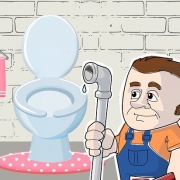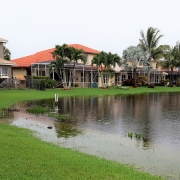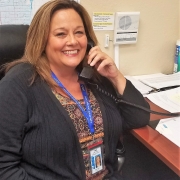It may surprise some residents within the Lake Worth Drainage District (LWDD) boundary to learn that the waterbody that is often referred to as the community lake is, in fact, a stormwater management pond. Although stormwater management ponds are often mistaken for lakes, they are very different. Lakes are naturally formed waterbodies whereas stormwater ponds are man-made and have a distinctive and important role in managing surface water quality and quantity.
A stormwater management pond is an engineered structure built to gather surface water runoff (rainfall). The pond temporarily stores water and then releases it at a controlled rate. Through a combination of landscape and structural features, stormwater management ponds allow sediment and contaminants to settle out of runoff water before it is released into drainage canals. Stormwater ponds also hold excess water during large storms thus protecting neighborhoods from flooding. Additionally, stormwater ponds are constructed to be an attractive feature for the community.
The goal of a stormwater pond is to mimic a natural lake, but this requires active maintenance by the community. Being a good steward of your pond means learning how to keep the pond healthy, functional and attractive. Residents can follow these general housekeeping rules for stormwater pond maintenance:
- Keep yard debris and pet waste out of ponds, drainage canals, swales, and storm drains.
- Pesticides and fertilizers need to be used and disposed of properly. They should never be broadcast over streets or sidewalks and only applied at the label rate.
- Properly dispose of all household hazardous materials such as paint, antifreeze or motor oil. For collection, sites visit Palm Beach County Solid Waste. (Link: Solid Waste Authority)
- Never hose chemicals off impermeable surfaces.
- Reduce erosion by planting Florida native plants and grasses overexposed areas. (Link: Palm Beach County Florida Native Plant Society)
Many commercial pond management companies can evaluate your community’s stormwater pond and offer suggestions for improvements. For more information about community flood control and stormwater pollution, visit LWDD’s website. (Link: www.lwdd.net)






